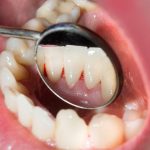Are you experiencing tooth or gum pain? Have you noticed redness and swelling in the gum around one of your teeth? If so, you may have a dental abscess.
In this article, find out about the causes and symptoms of dental abscesses and the best way to treat them.
What is a dental abscess?
A dental abscess is an accumulation of pus that forms as a result of a dental or periodontal infection. If bacteria spread and reach the dental pulp, the body can react by developing an abscess.
Abscesses develop around or inside the tooth (periodontal tissue or pulp) and can spread to the surrounding areas, such as the gum and bone. The problem usually causes significant pain that can only be relieved by treatment from an oral and maxillofacial health professional.
Causes
The most common causes of tooth abscesses are untreated cavities that reach the nerve (pulp) of the tooth and periodontitis, an infection of the tissues surrounding the tooth. There are a few other potential causes, including:
- A wound caused by trauma or injury that becomes infected
- A partially impacted wisdom tooth (gum covering part of the tooth) that becomes infected, which is called operculitis or pericoronitis depending on the diagnostic criteria
Symptoms
Common symptoms of a dental abscess include:
- Fever, chills, fatigue
- Halitosis (bad breath)
- Swollen gums or facial edema
- Difficulty fully opening the mouth
- Dysphagia (pain and difficulty swallowing)
- Localized toothache
- Sensitivity to hot or cold
Treatment
If you believe you may have a tooth abscess, it’s very important to make an appointment with a dental health specialist right away. Abscesses can spread elsewhere in the mouth and even move to other areas of the body, so it’s important to act fast.
Most of the time, endodontic treatment (root canal) or antibiotics will be sufficient to treat a dental abscess. However, if the infection is advanced, your dentist will refer you to an oral and maxillofacial surgery specialist for drainage. The procedure involves draining the pus and cleaning the wound to eliminate bacteria.
CAUTION: Under no circumstances should you try to drain the abscess yourself. This can do more harm than good, particularly because it increases the likelihood that the infection will spread. Consult a dentist to give yourself the best chance of a quick recovery.
Abscess drainage at Clinique MFML
In short, dental abscess treatments must be done by an oral health specialist.
At Clinique MFML, we perform minor dentoalveolar surgery, including abscess drainage. Contact us to obtain high-quality treatment in a timely manner.




